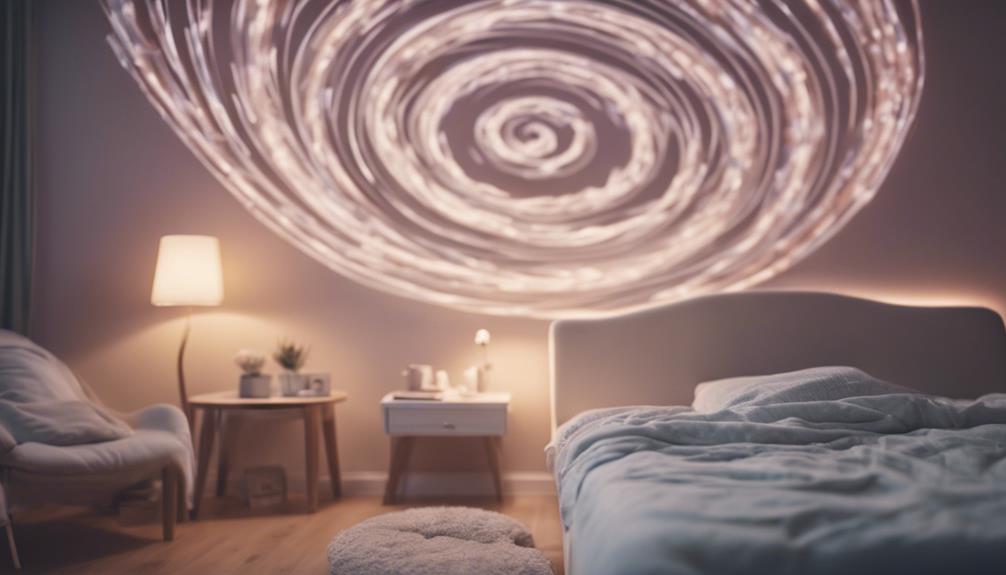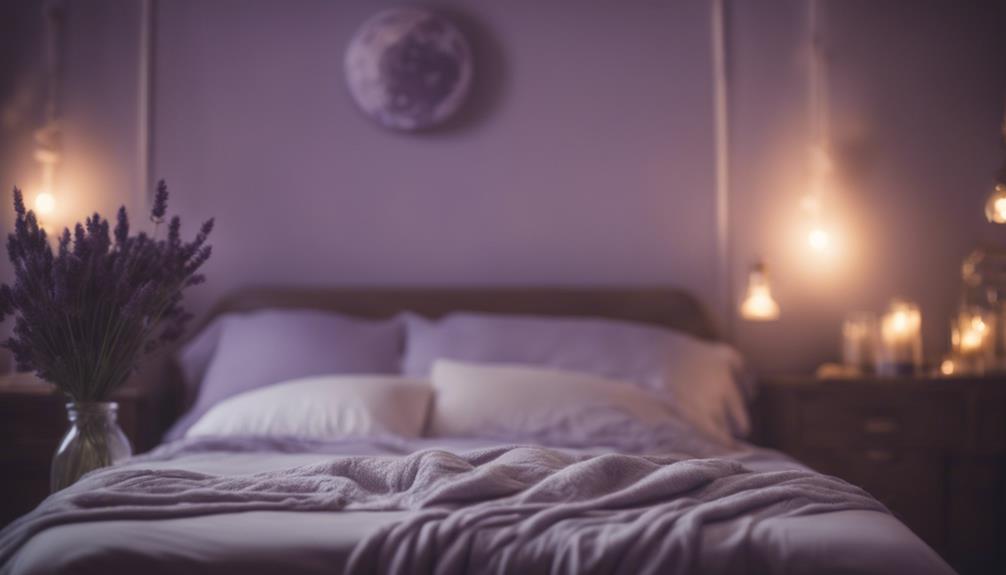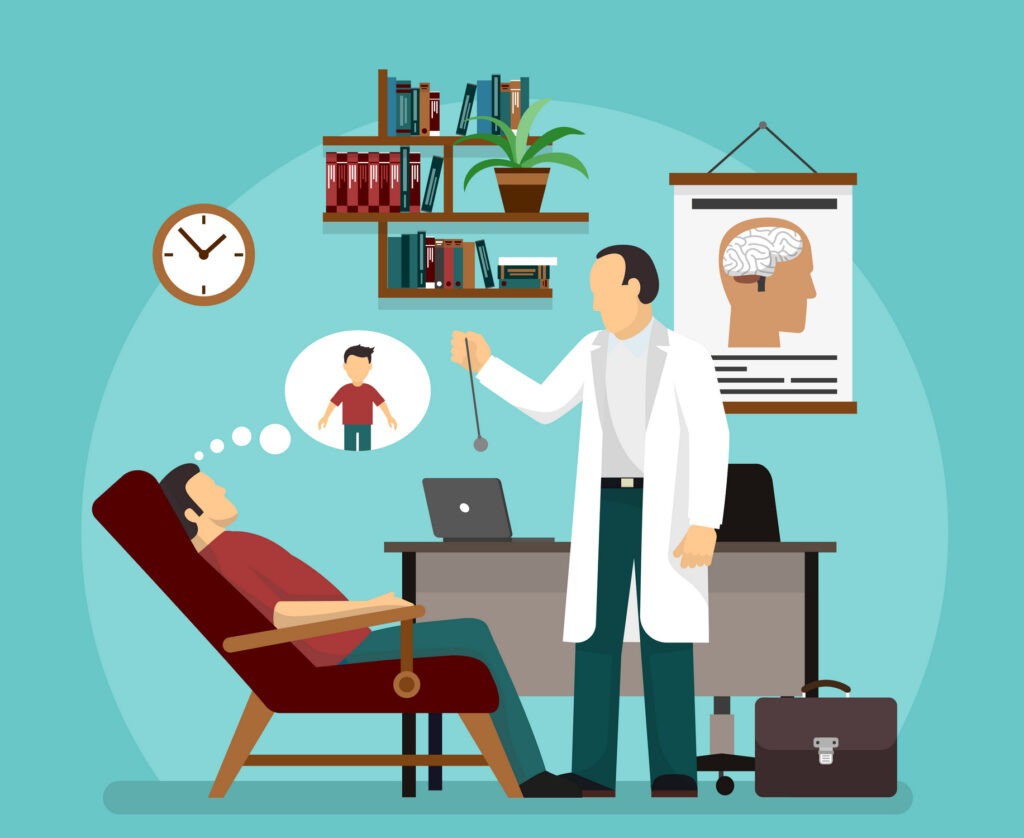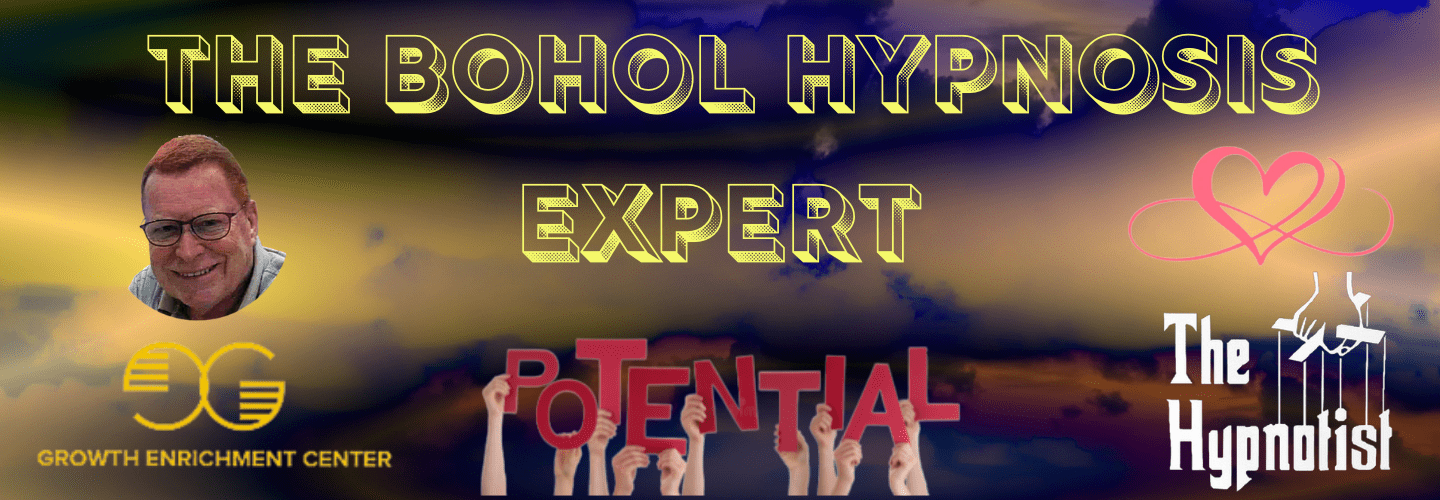
So why choose hypnosis? Hypnosis stands out as an effective option for addressing sleep anxiety by focusing on subconscious triggers and promoting deep relaxation, paving the way to improved sleep quality. By exploring the underlying causes and utilizing positive affirmations, hypnosis helps individuals in handling anxiety triggers and attaining a calmer state of mind conducive to better sleep. Its capacity to reframe negative thought patterns and encourage profound relaxation provides a comprehensive approach to addressing sleep anxiety. Through hypnosis, individuals can set out on a path towards lasting relief and enhanced mental well-being.
Key Takeaways
- Induces deep relaxation to ease sleep anxiety symptoms.
- Reprograms subconscious triggers with positive affirmations.
- Targets root causes for long-lasting anxiety relief.
- Enhances relaxation therapy for improved sleep patterns.
- Promotes mental resilience and self-empowerment for better sleep quality.
Understanding Sleep Anxiety
Understanding Sleep Anxiety can be vital in addressing the underlying causes of sleep disturbances and finding effective solutions for better sleep quality. Sleep disorders, such as insomnia or sleep apnea, can often be exacerbated by feelings of anxiety and stress.
When individuals experience sleep anxiety, it can manifest as racing thoughts, restlessness, or difficulty falling and staying asleep.
Stress management plays a pivotal role in addressing sleep anxiety. Techniques such as mindfulness meditation, deep breathing exercises, or cognitive-behavioral therapy can help individuals manage stress levels, leading to improved sleep patterns.
Identifying triggers of sleep anxiety, whether related to work, relationships, or health concerns, is a critical step in developing personalized stress management strategies.
How Hypnosis Works

Hypnosis operates by utilizing hypnotic relaxation techniques to induce a state of deep relaxation. Within this relaxed state, individuals become more receptive to suggestions, allowing for the reprogramming of subconscious anxiety triggers.
Through this process, hypnosis aims to address sleep anxiety by rewiring negative thought patterns and promoting a sense of calmness and security.
Hypnotic Relaxation Techniques
Through the utilization of focused attention and guided imagery, hypnotic relaxation techniques work to induce a state of deep relaxation in individuals experiencing sleep anxiety. By combining relaxation techniques with hypnotic suggestions, individuals can access a deeply relaxed state where they are more open to positive affirmations and suggestions. This process allows for the easing of tension and stress that often accompanies sleep anxiety, paving the way for a more peaceful and restful sleep experience.
Hypnotic relaxation techniques serve as a powerful tool for sleep anxiety relief by directly addressing the subconscious mind. Through this approach, individuals can undergo subconscious reprogramming, where negative thought patterns and beliefs contributing to sleep anxiety are replaced with more positive and calming ones.
As individuals repeatedly engage in hypnotic relaxation sessions, they can strengthen these new patterns, leading to a shift in their overall perception of sleep and anxiety. By fostering a sense of calm and relaxation, hypnotic techniques can help individuals break free from the cycle of sleep anxiety and enjoy improved sleep quality.
Subconscious Anxiety Reprogramming
Utilizing the power of suggestion, hypnosis facilitates the subconscious reprogramming of anxiety-related thought patterns and beliefs. Through this process, individuals can achieve profound relief from sleep anxiety.
Here’s how hypnosis works for subconscious anxiety reprogramming:
- Identifying Root Causes: Hypnosis helps individuals access their subconscious mind to uncover underlying causes of anxiety, enabling targeted reprogramming.
- Replacing Negative Patterns: By suggesting positive affirmations during hypnosis sessions, harmful thought patterns are gradually replaced with healthier beliefs.
- Enhancing Coping Mechanisms: Hypnosis equips individuals with new coping strategies to manage anxiety triggers effectively.
- Promoting Subconscious Healing: Through repeated sessions, hypnosis fosters lasting changes in the subconscious, promoting overall emotional well-being.
Addressing Root Causes

Identifying and understanding the underlying triggers and contributing factors is crucial when addressing the root causes of sleep anxiety. Taking a holistic approach to explore these root causes is vital in effectively managing and alleviating sleep-related anxiety. Root causes exploration involves delving into various aspects such as past traumas, stressors, lifestyle habits, and underlying mental health conditions that may be influencing an individual’s sleep patterns and contributing to their anxiety.
By uncovering these root causes, individuals can gain a deeper insight into the specific factors triggering their sleep anxiety. This understanding paves the way for targeted interventions that address the underlying issues at play, rather than merely alleviating surface-level symptoms.
A holistic approach emphasizes the interconnectedness of physical, mental, and emotional well-being, highlighting the importance of treating the individual as a whole.
In addressing root causes, individuals can work towards long-term resolution and develop coping strategies that promote better sleep and overall mental health.
Mind-Body Connection

Understanding the mind-body connection in the context of hypnosis for sleep anxiety relief underscores the power of suggestion in promoting mental well-being.
By harnessing the deep relaxation response induced during hypnosis sessions, individuals can effectively alleviate subconscious tension that hinders restful sleep.
Recognizing and nurturing this intricate relationship between the mind and body can pave the way for profound relaxation and improved sleep quality.
Power of Suggestion
The power of suggestion, within the context of hypnosis, plays a pivotal role in establishing the mind-body connection for addressing sleep anxiety. Through positive affirmations and mindful breathing techniques, individuals can harness the power of suggestion to reprogram their subconscious minds and promote relaxation conducive to better sleep.
Here are four key aspects where the power of suggestion comes into play:
- Reframing Negative Thoughts: Hypnosis helps individuals replace negative thought patterns with positive affirmations, fostering a more optimistic outlook that reduces anxiety and promotes restful sleep.
- Enhancing Relaxation Response: By suggesting feelings of calmness and tranquility, hypnosis can activate the body’s relaxation response, lowering stress levels and preparing the mind for sleep.
- Promoting Self-Efficacy: Through suggestive language, hypnosis empowers individuals to believe in their ability to overcome sleep anxiety, enhancing self-confidence and reducing pre-sleep worries.
- Strengthening Mind-Body Connection: The power of suggestion strengthens the connection between the mind and body, facilitating a harmonious state that encourages deep relaxation and peaceful sleep.
Deep Relaxation Response
A profound sense of tranquility envelops individuals as they explore the depths of their mind-body connection during deep relaxation responses induced by hypnosis. This state of deep relaxation goes beyond mere physical relaxation; it involves a mental and emotional calmness that can be highly beneficial for those struggling with sleep anxiety.
By tapping into the mind-body connection through hypnosis, individuals can experience a profound sense of peace and serenity, allowing them to let go of stress and worries that may be interfering with their ability to sleep soundly.
Incorporating techniques such as sleep hygiene and cognitive therapy alongside hypnosis can further enhance the deep relaxation response. Sleep hygiene practices help establish a conducive environment and routine for quality sleep, while cognitive therapy addresses and challenges negative thought patterns that contribute to anxiety and insomnia.
When combined with hypnosis, these approaches work synergistically to promote relaxation, alleviate anxiety, and improve overall sleep quality.
Alleviating Subconscious Tension
Subconscious tension, intricately intertwined with the mind-body connection, plays a pivotal role in shaping individuals’ responses to stress and anxiety, impacting their ability to achieve restful sleep. Addressing this tension through subconscious healing and relaxation therapy can be instrumental in promoting a sense of calm and improving sleep quality.
Here are four ways in which alleviating subconscious tension can aid in combating sleep anxiety:
- Enhanced Relaxation: By targeting subconscious tension, relaxation therapy can help individuals release pent-up stress and achieve a state of deep relaxation conducive to sleep.
- Improved Sleep Patterns: Alleviating subconscious tension can lead to more regular sleep patterns, reducing interruptions and enhancing overall sleep quality.
- Stress Reduction: Subconscious healing techniques can lower overall stress levels, making it easier for individuals to unwind and fall asleep peacefully.
- Mind-Body Harmony: Balancing subconscious tension fosters a harmonious relationship between the mind and body, promoting holistic well-being and aiding in sleep anxiety relief.
Incorporating subconscious healing into relaxation therapy can be a powerful tool in addressing sleep anxiety and fostering a restful night’s sleep.
Breaking Negative Thought Patterns

Addressing and reshaping detrimental thought patterns is a pivotal aspect of overcoming sleep anxiety through hypnosis. Cognitive restructuring plays a significant role in this process by helping individuals recognize and challenge negative beliefs that contribute to their anxiety. By replacing these harmful thoughts with more positive and constructive ones, individuals can begin to reframe their perspective on sleep and reduce the anxiety associated with it. Positive affirmations are often used in hypnosis sessions to reinforce these new thought patterns and instill a sense of confidence and calmness.
In addition to cognitive restructuring, behavioral modification techniques are utilized to break the cycle of negative thinking that fuels sleep anxiety. Through relaxation exercises such as deep breathing, progressive muscle relaxation, and guided imagery, individuals can learn to manage their stress levels and promote a sense of relaxation before bedtime. These techniques not only help in combating immediate feelings of anxiety but also contribute to long-term improvement in sleep quality.
Deep Relaxation Techniques

Utilizing deep relaxation techniques is a fundamental component of hypnosis therapy aimed at alleviating sleep anxiety and promoting restful sleep patterns. By incorporating stress management strategies and enhancing sleep hygiene practices, individuals can experience profound improvements in their overall sleep quality and reduce anxiety levels.
Here are four key deep relaxation techniques commonly used in hypnosis therapy:
- Progressive Muscle Relaxation: This technique involves sequentially tensing and relaxing different muscle groups to release physical tension and induce a state of deep relaxation.
- Guided Imagery: Through visualization exercises, individuals can create calming mental images to promote relaxation, reduce stress, and improve sleep quality.
- Diaphragmatic Breathing: Focusing on deep, slow breathing techniques can help regulate the autonomic nervous system, promoting relaxation and reducing anxiety.
- Mindfulness Meditation: By cultivating present-moment awareness and acceptance, mindfulness meditation can aid in managing stress, promoting relaxation, and improving sleep patterns.
Promoting Restful Sleep

In the pursuit of enhancing sleep quality and alleviating anxiety, creating a conducive environment for restful sleep is vital. Sleep hygiene plays an essential role in promoting restful sleep by establishing practices that signal to the body and mind that it is time to unwind and prepare for rest.
Simple habits like maintaining a consistent sleep schedule, keeping the sleep environment dark and quiet, and limiting screen time before bed can greatly impact the quality of sleep.
Furthermore, incorporating therapeutic benefits such as relaxation techniques, deep breathing exercises, or even listening to calming music can aid in reducing anxiety levels and promoting a sense of calm before bedtime. These practices not only help in falling asleep faster but also contribute to a more rejuvenating sleep experience throughout the night.
Building Self-Confidence

Enhancing self-confidence is a fundamental aspect of fostering mental well-being and overall personal growth. Building self-confidence through hypnosis can be a powerful tool in overcoming sleep anxiety and improving overall quality of life.
Here are four key ways in which hypnosis can aid in boosting self-confidence:
- Self-esteem Boost: Hypnosis can target negative self-perceptions and replace them with positive beliefs, leading to a healthier sense of self-esteem.
- Confidence Building: Through guided hypnosis sessions, individuals can visualize themselves as confident and capable, reinforcing these traits in their subconscious mind.
- Empowerment Techniques: Hypnosis can provide individuals with the mental tools and strategies needed to feel empowered in challenging situations, promoting a sense of control and confidence.
- Positive Affirmations: By incorporating positive affirmations into hypnosis sessions, individuals can rewire their thought patterns towards self-empowerment and confidence, paving the way for improved sleep and reduced anxiety.
Long-Term Benefits

Moving beyond the immediate benefits, exploring the long-term advantages of incorporating hypnosis for self-confidence and sleep anxiety relief reveals a lasting impact on overall well-being and mental resilience.
One significant long-term benefit of utilizing hypnosis for sleep anxiety relief is the improvement in sleep patterns. By addressing the root causes of anxiety triggers through hypnotherapy, individuals can experience better sleep quality over time. Hypnosis helps individuals reframe negative thought patterns and behaviors that contribute to sleep disturbances, leading to a more sustainable improvement in overall sleep hygiene.
Furthermore, the long-term effects of hypnosis extend to managing anxiety triggers. Through hypnotherapy sessions focused on building coping mechanisms and resilience, individuals can develop skills to address anxiety triggers effectively. By reprogramming the subconscious mind to respond to stressors in a more adaptive manner, individuals can experience reduced anxiety levels in the long run.
This shift in mindset and behavior not only aids in sleep anxiety relief but also enhances overall mental well-being and resilience, providing lasting benefits for individuals seeking long-term solutions to their sleep-related concerns.
Frequently Asked Questions Why Choose Hypnosis
Can Hypnosis for Sleep Anxiety Be Done Remotely?
Yes, hypnosis for sleep anxiety can be conducted remotely through virtual sessions. Research shows that remote sessions can be as effective as in-person ones, offering benefits like convenience. However, limitations may include potential technological barriers and challenges in creating a relaxing environment.
Are There Any Age Restrictions for Hypnosis Therapy?
Age restrictions in hypnosis therapy vary. Child therapy typically requires parental consent and a practitioner experienced in working with children. Senior treatment may involve considerations for cognitive abilities. Finding a qualified practitioner is crucial for all age groups.
How Many Sessions Are Typically Needed for Results?
The number of sessions required for hypnosis therapy varies based on individual needs. Session frequency is often determined by the therapist and the client’s progress. Results can be immediate, but long-term benefits are typically achieved with a customized approach.
Is Hypnosis Safe for Individuals With Mental Health Conditions?
When considering hypnosis for individuals with mental health conditions, it is important to address safety concerns. Hypnosis can be effective, but it is vital to make sure it is conducted by a qualified professional for accessibility and convenience.
Can Hypnosis Help With Other Types of Anxiety Besides Sleep Anxiety?
Hypnosis has shown promise in addressing general anxiety, stress relief, phobias, and panic attacks. Research suggests that hypnotherapy can be effective in managing various anxiety disorders beyond sleep anxiety, offering a potential holistic approach to mental well-being.
Conclusion
Finally, hypnosis can be a beneficial tool for individuals experiencing sleep anxiety. Research has shown that 85% of people who have tried hypnosis for sleep disorders have reported improved sleep quality and reduced anxiety levels.
By addressing the root causes of sleep anxiety, breaking negative thought patterns, and promoting deep relaxation, hypnosis can help individuals achieve restful sleep and build self-confidence in the long term.

Take the Next Step, Make An Appointment
Do not be afraid to reach out to me, Mark , to assist you in any issues you might have. Need a good listener or someone to confidentially talk too? . Life Coaching is 45 minute session, once a week.
Self-Hypnosis is taught in one session, individual sessions or in a group, and lasts a lifetime. Most Hypnotherapy sessions including Age regression last 2 hours and EFT Sessions are usually handled with a one hour session
To make an appointment, first listen to the Pre-talk and fill out the Complementary Healthcare Provider Disclosure. The use the Contact Form to request an appointment with, Mark, The Bohol Hypnosis Expert.
Self-help downloads are available to help you with specific problems. The self-hypnosis program to teach you how to self-hypnotize yourself is available here.





